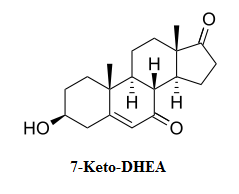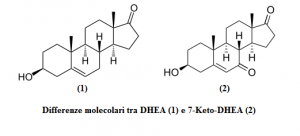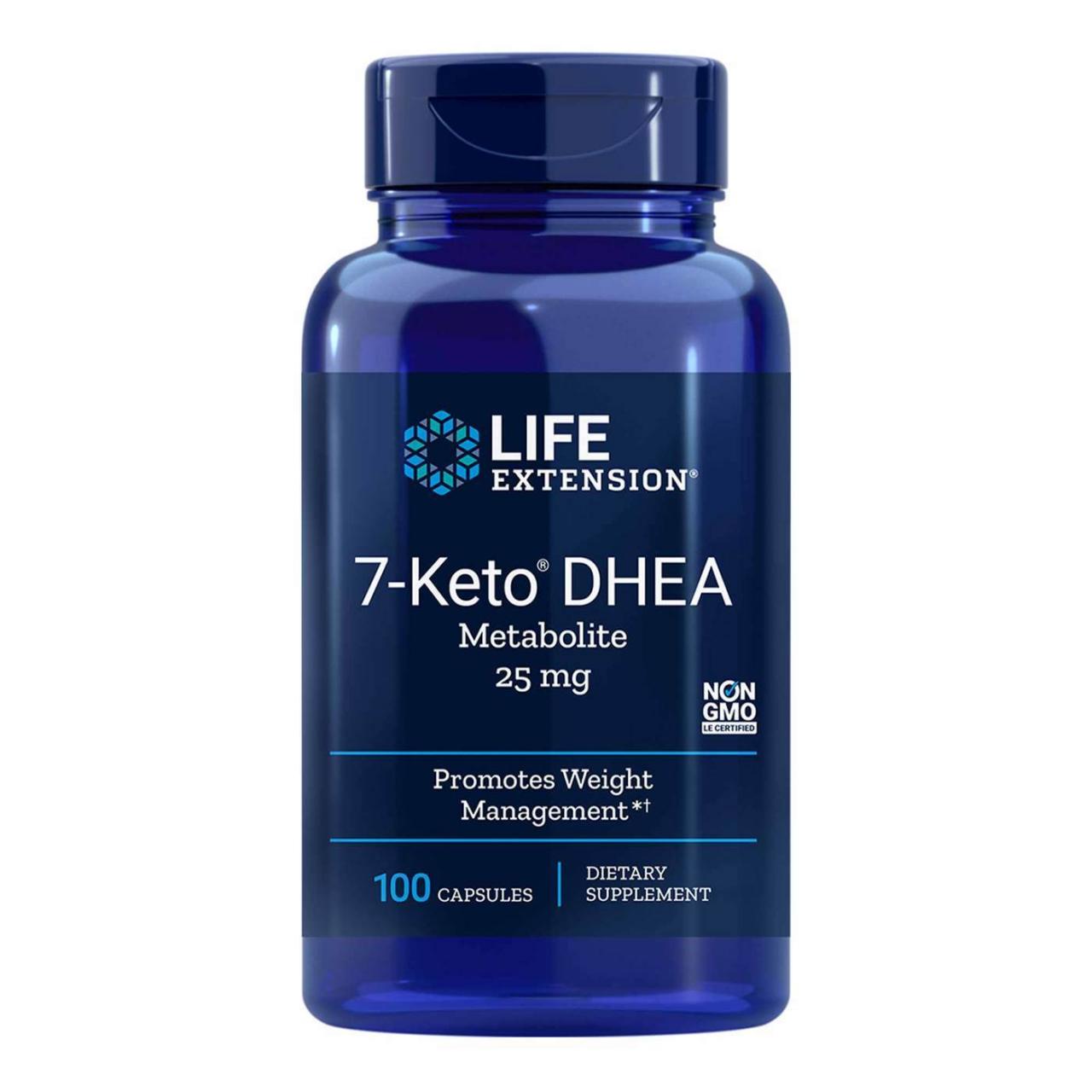 7-keto-DHEA (also known as 7-keto, 7-ketodehydroepiandrosterone or 7-oxodehydroepiandrosterone) is a steroid produced by the metabolism of the pro-adrenal hormone dehydroepiandrosterone (DHEA). 7-Keto does not convert to testosterone or estrogen and has therefore been studied as a substitute for DHEA. It is often used in the “prodrug” form of 7-keto-DHEA-acetate.
7-keto-DHEA (also known as 7-keto, 7-ketodehydroepiandrosterone or 7-oxodehydroepiandrosterone) is a steroid produced by the metabolism of the pro-adrenal hormone dehydroepiandrosterone (DHEA). 7-Keto does not convert to testosterone or estrogen and has therefore been studied as a substitute for DHEA. It is often used in the “prodrug” form of 7-keto-DHEA-acetate.
In vitro and animal studies have shown the potential benefits of 7-keto for humans, but there is currently insufficient scientific evidence to support its use as a weight loss, weight loss / growth aid. muscle, immune stimulus, or any other clinical use. However, 7-Keto has been marketed since 1998 as a dietary supplement to lose weight, increase metabolism, improve memory and prevent age-related changes. When used in a topical solution (skin lotion), 7-Keto causes long-term changes in physiological levels of testosterone, epitestosterone, estradiol, and other steroid hormones. Research has shown that the use of supplements containing this molecule can lead to positive anti-doping test results. The World Anti-Doping Agency has included 7-Keto DHEA on the list of prohibited anabolic agents.
 To search for any DHEA metabolites that might be more biologically active, more specific, and less likely to be converted to sex hormones, Dr. Lardy launched a DHEA derivative assay program. The activity of 150 of these metabolites was monitored by measuring the induction of two thermogenic enzymes, mitochondrial glycerol-3-phosphate dehydrogenase and cytosolic malic enzyme. The results of this reference study were published in 1998 in the journal Steroids and showed that many of these steroids did not induce the activity of these thermogenic enzymes, while the metabolite 7-Keto did. In fact, 7-keto was 2.5 times more active than DHEA to induce the activity of these thermogenic enzymes. Following Marenich’s work, urinary excretion of 7-keto was found to decrease with age, similar to the parent compound, DHEA. Based on the benefits found, the metabolite 7-Keto was selected for further research as a weight loss compound.
To search for any DHEA metabolites that might be more biologically active, more specific, and less likely to be converted to sex hormones, Dr. Lardy launched a DHEA derivative assay program. The activity of 150 of these metabolites was monitored by measuring the induction of two thermogenic enzymes, mitochondrial glycerol-3-phosphate dehydrogenase and cytosolic malic enzyme. The results of this reference study were published in 1998 in the journal Steroids and showed that many of these steroids did not induce the activity of these thermogenic enzymes, while the metabolite 7-Keto did. In fact, 7-keto was 2.5 times more active than DHEA to induce the activity of these thermogenic enzymes. Following Marenich’s work, urinary excretion of 7-keto was found to decrease with age, similar to the parent compound, DHEA. Based on the benefits found, the metabolite 7-Keto was selected for further research as a weight loss compound.
7-Keto is legally marketed in the United States and the United Kingdom as a dietary supplement.
7-Keto has unique characteristics among DHEA derivatives due to oxygenation at the 7th position. This structural modification gives the molecule its own characteristics, and research has shown that 7-Keto-DHEA has many different effects on the body.
7-Keto has a documented thermogenic effect in rats. This action is achieved by activating three thermogenic enzymes:
- Glycerol-3-phosphate dehydrogenase
- Raspberry enzyme
- Acyl-CoA oxidase
According to the biological definition of thermogenesis, all three of these enzymes activate a less efficient pathway for ATP synthesis to produce heat. Therefore, these enzymes also promote the use of fat stores for energy and heat production. This is the ability that 7-Keto has to improve thermogenesis and, through this mechanism, accelerate the use of body fat for energy purposes.
A 2007 study found that administering 7-keto to overweight adults and in combination with a low-calorie diet effectively reversed the decline in resting metabolic rate (RMR) normally associated with diet. 7-Keto has been shown to have the ability to increase RMR by 1.4% above baseline levels and has been shown to result in a 5.4% daily increase in RMR when administered on a low-calorie diet.
7-Keto achieves this thermogenic effect without the effects of the cardiovascular or central nervous system, which are the effects usually associated with the use of classical thermogenic agents such as ephedrine and clenbuterol kaufen.
Athletes, especially BodyBuilders, also use 7-keto for its ability to reduce cortisol activity at the enzymatic level at a dose of 200 mg / day, divided into two equal doses (usually as soon as you wake up and after training): its administration is supported in within 4-6 weeks to avoid possible cortisol recovery.
Although the aging process affects all segments of the immune system, researchers have identified changes in T-cell-mediated immune function in older adults. Decreased immune function of T cells is associated with increased susceptibility to infections. For example, people with age-related declines in cellular immunity have an altered response to the influenza vaccine, making them more susceptible to getting the “flu,” even if they received the vaccine.
A clinical study presented at the April 2004 meeting of the Federation of American Societies for Experimental Biology evaluated the effect of 7-keto on immune function in the elderly.
7-Keto has passed a series of toxicology evaluations. These studies include: AMES mutagenicity test, acute oral dose LD50 in rats, oral tube escalation in rhesus monkeys, and 28-day oral stomach in rhesus monkeys. There were no side effects in any of these studies. This preclinical work was followed by a phase I human safety study led by Davidson and colleagues at the Chicago Clinical Research Center. This study was published in Clinical Research Medicine and showed that 7-Keto is safe in humans up to a dose of 200 mg / day for 4 weeks. As with toxicology studies, there were no serious adverse reactions or hormonal side effects. Long-term safety data (> 4 weeks) are not available. In addition, a complete pharmacokinetic analysis was included as part of this study. This pharmacokinetic analysis describes how the body absorbs, metabolizes, distributes and removes 7-keto. This shows that 7-keto is rapidly absorbed and converted to its sulfate derivative, which reaches peak plasma concentrations after 2.2 hours and has a half-life of 2.17 hours, and does not accumulate with repeated administrations. To date, there have been two FDA notices authorizing the free sale of products containing 7-Keto as a food ingredient. The FDA intended to declare the safety of products containing this ingredient through these notices. In the aforementioned notices, the FDA had nothing against selling and selling products containing 7-Keto.

Similar to DHEA, 7-keto is rapidly sulfated in the body to 7-keto sulfate. An assay method was developed for the quantitative determination of 7-ketosulfate in human plasma. This was an HPLC method that used calibration curves for 7-ketosulfate ranging from 10 to 500 ng / ml. The trough levels were measured after each dose in ascending order; 0.50, 100 and 200 mg per day. Basic plasma concentrations increase in proportion to the daily dose administered. Mean levels (15.8 ng / ml) after 1 week at 200 mg / day were similar to those measured after 4 weeks of treatment (16.3 ng / ml). This indicates that the relationship between the rate of metabolite formation and its elimination is constant during repeated administration and does not accumulate. After a 12 hour washout period, 22 subjects received a single dose of 100 mg of 7-Keto, and plasma levels were quantified at 0.25, 0.50, 1.0, 2.0, 4.0, 6.0, and 12. 0 hours post-dose: The mean plasma concentrations measured in the study showed a peak plasma level of 158 ng / mL 2.2 hours after dosing. The half-life was 2.17 hours. Based on the data, a twice daily dosing regimen has been recommended as the ideal dosing schedule if the goal is to maintain a constant blood level.
The results of this study indicated that there were conflicting cases between:
- half of measured plasma levels
- Plasma concentration of a single dose of 100 mg orally.
Thus, with repeated doses, accumulation does not occur, and when taken twice daily, it should reach steady state plasma levels after 11 hours.
In conclusion, 7-Keto is useful as a supplement to improve performance during periods of calorie restriction, when the athlete’s primary goal is to accelerate fat intake and maximize muscle retention. The dose useful for this purpose remains 200 mg / day, divided into two equal doses. I also remember that long term use (more than four weeks) is not recommended due to the possible rebound of cortisol.

